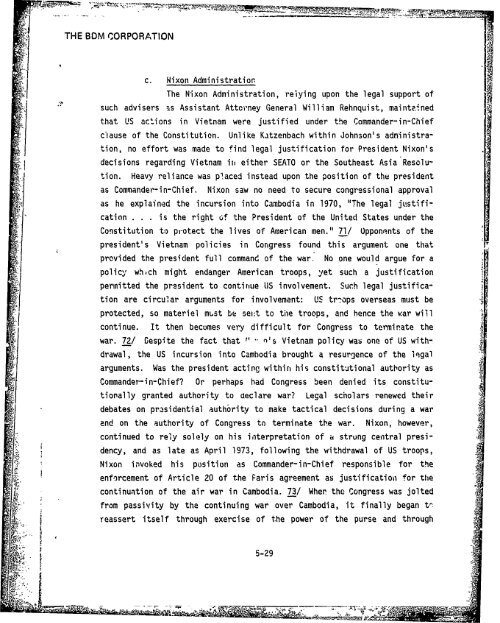policy - The Black Vault
policy - The Black Vault
policy - The Black Vault
You also want an ePaper? Increase the reach of your titles
YUMPU automatically turns print PDFs into web optimized ePapers that Google loves.
THE BDM CORPORATION<br />
C. Nixon Administration<br />
<strong>The</strong> Nixon Administration,<br />
relying upon the legal support of<br />
such advisers -As Assistant Attoroney General William Rehnquist, maintained<br />
that US<br />
actions in Vietnam were justified under the Commander-in-Chief<br />
clause of the Constitution.<br />
Unlike Katzenbach within Johnson's administration,<br />
no effort was made to find legal justification for President Nixon's<br />
decisions regarding Vietnam iii either SEATO or the Southeast Asia Resolution.<br />
Heavy reliance was placed instead upon the position of the president<br />
as Commander-in-Chief.<br />
Nixon saw no need to secure congressional approval<br />
as he explained the incursion into Cambodia in 1970, "<strong>The</strong> legal justification<br />
. . is the right of the President of the United States under the<br />
Constitution to protect the lives of American men." 71/ Opponents of the<br />
president's Vietnam policies in Congress found this argument one that<br />
provided the president full command of the war. No one would argue for a<br />
<strong>policy</strong> which might endanger American troops, yet such a justification<br />
permitted the president to continue US involvement. Such legal justification<br />
are circular arguments for involvement: US tr-ýops overseas must be •<br />
protected, so materiel must be sei:t to the troops, and hence the war will<br />
continue. It then becomes very difficult for Congress to terminate the<br />
war. 72/ Gespite the fact that .'s o,<br />
Vietnam <strong>policy</strong> was one of US withdrawal,<br />
the US incursion into Cambodia brought a resurgence of the legal<br />
arguments.<br />
Was the president acting within his constitutional authority as<br />
Commander-in-Chief? Or perhaps had Congress been denied its constitutionally<br />
granted authority to aeclare war? Legal scholars renewed their<br />
debates on prasidential authority to make tactical decisions during a war<br />
Sand on the authority of Congress to terminate the war. Nixon, however,<br />
continued to rely solely on his interpretation of a strung central presidency,<br />
and as late as April 1973, following the withdrawal of US troops,<br />
Nixon invoked his position as Commander-in-Chief responsible for the<br />
enforcement of Article 20 of the Paris agreement as justification for the<br />
E" continuation of the air war in Cambodia. 73/ Wher the Congress was jolted<br />
from passivity by the continuing war over Cambodia, it finally began tV<br />
reassert itself through exercise of the power of the purse and through<br />
I, 5-29
















